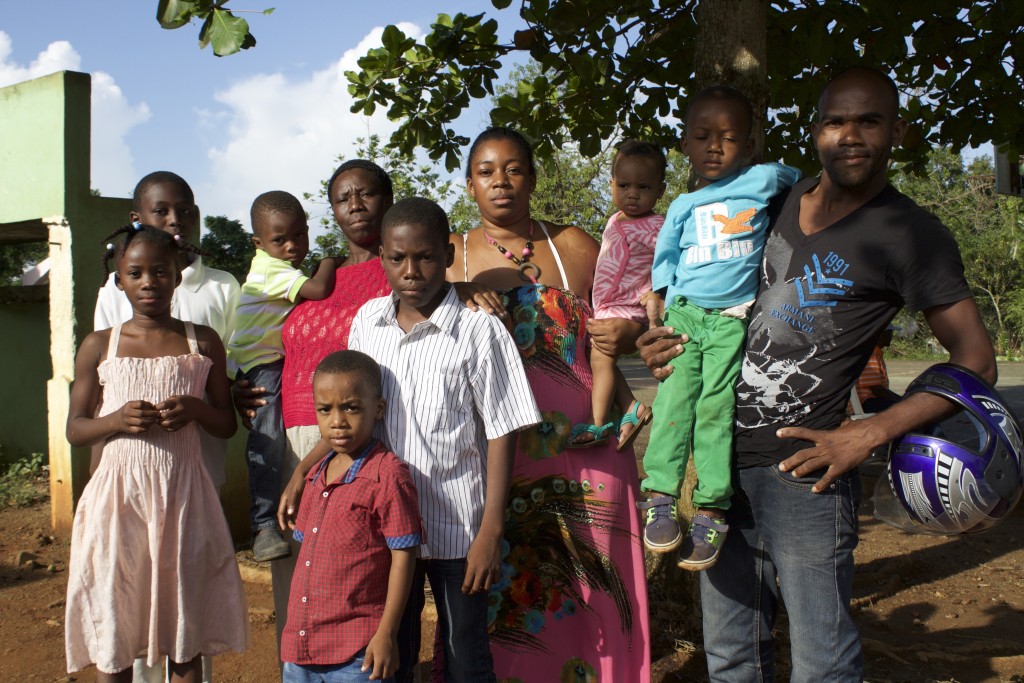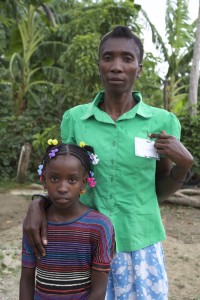
Tens of thousands of people of Haitian descent have been deprived of their Dominican nationality and are now at risk of being expelled from their home country.
Marselha: Do you have any questions for me?
Woman: Can you help me get this child a birth certificate?
Marselha: Unfortunately I cannot, but I can tell your story.
I heard that question some dozen times in the interval of less than three days as I interviewed mothers whose children were born and raised in the Dominican Republic and were refused their birth certificates.
I am in the Dominican Republic as part of an Amnesty International mission as the country faces a human rights crisis. We are here to monitor if stateless individuals are being expelled to Haiti as deportation of undocumented migrants resumed June 18.
What’s the crisis?
Tens of thousands of people are at risk of being forced to leave the country, following a 2013 Constitutional Court ruling to retroactively deprive people of foreign descent of their Dominican nationality. This ruling has been applied to those born in the Dominican Republic to undocumented parents between 1929 and 2010, making them stateless.
DR is making people of Haitian descent legally statelessness in violation of int’l law. But what is statelessness? http://t.co/UVU35MpHy2
— AJ+ (@ajplus) June 18, 2015
Amnesty International and human rights bodies, including the Inter-American Commission and Court on Human Rights and the UN Office of the High Commissioner for Human Rights, have voiced serious concerns that this ruling is discriminatory, as it disproportionately affects people of Haitian descent. June 18, 2015 marked the official date in which Dominican authorities could potentially force the thousands of newly stateless Dominicans to leave their home country. Why should you care? In a nation of immigrants like the United States, unless you are Native American, you, your parents or ancestors came from somewhere else. Imagine giving birth to a child, and the hospital not giving you a piece of paper declaring she was born, because you don’t have an ID card. You don’t have an ID card because your mother was denied your birth certificate. Imagine not being able to get a job because you don’t have any documents. And then, imagine the government of the only country you have ever known to be your home –the country in which you were born and in which your parents were born– says that you need to go back to where your ancestors came from. This is actually happening in the Dominican Republic.

Susana, 9, and her mother in Valverde Mao Province in the Dominican Republic. Susana is unable to get proof of nationality, despite being born in the Dominican Republic, and is now at risk of being forced to leave her home country. (c)Amnesty International
Far away from the pristine beaches or the busy streets of Santo Domingo is the municipality of Esperanza in Valverde Mao Province. After some four hours driving northwest of the capital, tucked away between rolling hills and lush vegetation, the Amnesty delegation arrives in the forgotten communities of Laguna Salada and Batey Libertad. When we get there, dozens of individuals are waiting for us in the mighty sun that hits the Caribbean at midday.
Esmeralda, Ludrix, Rosadana, Renande, Susana, Eliane, Junior, Taile, Juna, Manuca, Colo, Angelot, Ismylove, Euns, Stefani, Jennifer, Reginaldo, Roberto, Fania, Janita, Robin, Carolina, Manuel, Ezai. All these children do not have any document as proof that they exist. Some of them are in school, some of them are not, and those in school must dread the arrival of 7th grade, when they won’t be able to show a birth certificate to continue studying.
A few proud children shoot me a wide grin and present crumbled dirty vaccination records. The hospital in this region refused to give their mothers any certification when their children were born, and so a vaccination record is the only official document they possess.
Caught in different legal schemes, and a bureaucratic imbroglio marred with racial undertones, these children are condemned to live in abject poverty, without the possibility to finish their education, the possibility to hold a decent paying job, and with an uncertain fate. That they live in places named after freedom (libertad) and hope (esperanza) feels like a cruel irony.
One hour driving north from the outskirts of Santo Domingo in the rural community of Guanuma, Fifa walks out with her mother, Olga, four of her eight siblings and three of her children. Olga was born in 1971 and arrived in the Dominican Republic in 1984. Her husband, Decima, had arrived in the country in 1971 to work in the sugar cane fields. Olga proudly shows me a worker’s card from the sugar mill her family was attached to in the 1980s. None of Olga and Decima’s nine children and six grandchildren have even been given a birth certificate, despite lifetimes of living and working in this country. Without a birth declaration, a parent cannot register his or her children, so that child won’t have a birth registration, required for school, or an identity card later in life to get a job or register their child. Without these identity documents, one cannot get married, or get a passport.
Now, imagine again if that was happening to you, your parents or your children in the United States…
Why am I telling you all this? Why now?
Throughout the almost ten years I have been working on this issue, I have heard hundreds of similar stories and have retold hundreds more, in the halls of Congress, at the U.S. State Department, with foreign diplomats and journalists.
Many have ignored a decade of slow suffering, but they cannot ignore this active, urgent crisis. As reported in a recent spate of big news stories, tens of thousands individuals are at imminent risk. Despite warnings, recommendations and rulings from international human rights bodies, the Dominican Republic’s so-called solutions to these problems are filled with requirements galore, bureaucratic nightmares, and tarnished with prejudice in implementation.
What these kids have in common?They’re poor, black, stateless #UncertainFate #BlackLivesMatter http://t.co/lEfKFdC4Nt pic.twitter.com/lfPWguUXTP — Marselha G Margerin (@marselhagm) June 20, 2015
Can you help me tell these stories, and maybe change their uncertain fate?
Join Amnesty International and tell the President of the Dominican Republic not to expel these individuals: www.amnestyusa.org/CrisisInDR
This seems so arbitrary – what was the reason for the 2013 ruling? And why go back to 1929? Who is behind this? What do "documented" Dominicans say? This makes no sense to me.
Can they appeal to the International Court of Justice (IJC) known as World Court? The Domenican Republic is an active member of the United Nations. When these families went to the Domenican Republic they were fleeing poverty and human rights violations in Haiti.
Damn shame if you ask me.
J. Mac Rust
For crying out loud, what is becoming of this world?!
Charles McCorquodale Law
http://www.unitedstatesrepublic.us/
Try the DNA possibly it will tie the blood back to the soil blood is to track record have the DNA analyzed find out what is their haplogroup group